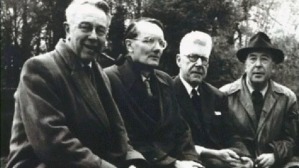Friendship and kinship in the age of social media
Last Sunday was our 45th wedding anniversary.
It’s not a major anniversary like the 25th or 50th. but it seemed worth remembering, and remembering some of the people we have known, both before we were married and in our 45 years together. We didn’t have a big celebration — a cheap cake from the supermarket at teatime sufficed. And we did a few things on social media.
- I posted a link to a description of our wedding on our family history blog. It was posted on Facebook and Twitter.
- Val scanned some photos of our wedding and posted them on Facebook.
The response to the photo album on Facebook was:
Likes etc from Jethro Hayes, Jenny Aitchison and 46 others
36 comments
2 shares
The response on Facebook to the link to the blog post was:
Likes from Jethro Hayes, Jenny Aitchison and 72 others
27 comments
4 shares
And the response to the blog post itself was:
 I also posted “then and now” photos in a photo album on Facebook, but one cannot tell much from responses to those because most people responded to the album itself rather than those particular pictures.
I also posted “then and now” photos in a photo album on Facebook, but one cannot tell much from responses to those because most people responded to the album itself rather than those particular pictures.
But it was interesting to see who responded and who didn’t, and to think of what it might have been like without social media.
Responses on the blog link on Facebook:
- 9 from people we have seen face to face within the last 3 years
- 18 from people we have never met, but have only interacted with on line
- 5 from close family (2nd cousin or closer)
- 9 from extended family (more distant than 2nd cousin)
What conclusions can one draw from this?
- absence makes the heart grow fonder
- familiarity breeds contempt
The more you see people and the closer you get to them, the less they like you.
Of course this has to be balanced against how many people the social media platforms’ algorithms actually showed them to. I have 926 followers on Twitter, of whom 2 responded. I have 591 “friends” on Facebook, with responses as indicated above, and I suppose 315 views of the blog post isn’t a bad response.
What it seems to show is what most of us already knew — social media, and the Internet generally enable us to keep in touch with friends, family and acquaintances whom we haven’t seen for a long time and who live far away. Quite a lot of the people who responded were actually at our wedding, though we haven’t seen several of them for 40 years or more. Social media have enabled us to reestablish and maintain contact with them.
Facebook seems to do it a lot better than Twitter. In fact Twitter seems to be pretty useless as a social medium. In spite of having nearly twice as many Twitter followers as Facebook friends, the response from Twitter was minimal.
But it also leaves a niggling thought — what about the closer family and the people we’ve seen recently who didn’t respond? Is their lack of response due to social media algorithms or because they are offended with us in some way? So social media can bring people can bring people closer together, but can also sow suspicion and mistrust.
Here, for what it’s worth, are the “then” and “now” photos.
The first was on our wedding day 45 years ago, wearing the wedding garments that Val made (they no longer fit).
Other observations … Val’s hair was wavy then, perhaps because we were living at the coast, and humidity makes for wavy hair. We’ve been living inland for more than 35 years, and that seems to make for straighter hair. .
Now, of course, our hair is also grey.
And the cap is in honour of our Subaru station wagon, the best car I ever owned.
And so we carry on, much along the lines of the theme song of the BBC’s New Tricks TV programme:
It’s all right, it’s OK
Doesn’t really matter if you’re old and grey.
It’s all right, it’s OK
Listen to what I say.
It’s all right, doing fine.
Doesn’t really matter if the sun don’t shine.
It’s all right, it’s OK.
Getting to the end of the day.













